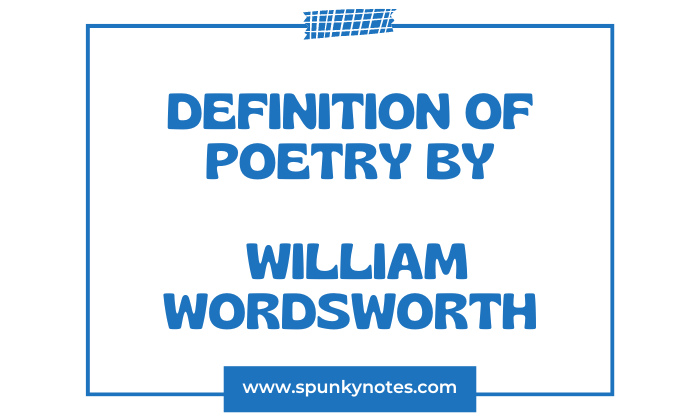
Q. Write an analysis of the definition of poetry by William Wordsworth.
Q. What is poetry, according to William Wordsworth?
A prominent English Romantic poet, William Wordsworth, defined poetry as:
The spontaneous overflow of powerful feelings: it takes its origin from emotion recollected in tranquility.
This definition comes from the preface to his book, “Lyrical Ballads.” In saying that poetry is the “spontaneous overflow of powerful feelings,” Wordsworth positions poetry as a deeply personal and emotional expression.
He suggests that poetry is born from strong emotions that cannot be contained. These emotions overflow or express themselves spontaneously in the form of poetry.
The Spontaneous overflow of powerful feelings.
Wordsworth believes that poetry comes from strong emotions and does not result from a cold, clinical analysis of reality. He thinks poetry is like a natural and spontaneous outburst of feelings.
The term “overflow” portrays a brimming excess, suggesting that the emotional intensity of creating poetry surpasses ordinary boundaries. Wordsworth states that this emotional intensity is fundamental to genuine poetic expression.
However, spontaneity does not mean a lack of control or disorder. Wordsworth’s poetry carefully balances the rush of feelings and organizes them into a form that others can appreciate.
It exemplifies a skillful combination of emotions and structured expression. It is a union of heart and mind, where feelings provide the raw material, and the intellect sculpts it coherently.
Emotions recollected in tranquillity.
Wordsworth’s concept of “emotions recollected in tranquillity” underscores the importance of introspection and reflective thought in creating meaningful poetry. It is not a mere retracing of past emotions but a deep, contemplative dive into the sea of feelings initially stirred by spontaneous experiences.
“Recollected in tranquillity” implies a re-exploration of emotions in peace or calm. During these moments of quiet introspection, the raw material of feelings is distilled into its poetic essence.
Here, the poet doesn’t only remember, but he also goes back, rethinks, and relives those experiences. This process is akin to gazing at a landscape through different lenses, each providing a unique perspective, depth, and hue.
This tranquil recollection gives the poet the space to give shape and form to their emotions. It organizes the chaos of raw feelings, making the fleeting emotions everlasting. It transforms the rush of spontaneous emotion into a deliberate and thoughtful reflection.
The Interplay Between Spontaneity and Reflection
According to Wordsworth, poetry is a mix of quick feelings and thoughtful reflection, both essential for a deeply emotional poem.
The first part—the “spontaneous overflow of powerful feelings”—is the kindling of the poetic flame. It is a surge of raw emotion, triggered perhaps by a moment of beauty, an encounter, a memory, or a thought.
This spontaneous eruption represents the lifeblood of poetry, the initial impetus that sets the poetic wheel in motion. In the initial stage of creating a poem, there’s a deep, raw surge of feelings that come straight from the heart. This is where the emotional core of the poem takes shape.
This phase is powerful because of its genuine and immediate nature; it’s like a poet has been handed a lump of untouched clay full of potential. The authenticity in this stage gives the poem its true essence, and it’s up to the poet to mold and refine it further.
Revisiting the initial emotional surge in a tranquil state provides balance and structure. In this reflective phase, the poet sifts through the emotional residue, examining, analyzing, and refining the raw feelings.
This quiet introspection acts as the potter’s wheel, molding the raw clay into a shape and giving form to the previously formless emotions. It is where the poetic craft comes into play, turning the raw material into art.
The balance between quick feelings and reflection is essential. Without reflection, raw emotions can become messy. But without those emotions, the poem might feel dull and lifeless. They work together to create something beautiful.
The mix of quick feelings and careful thought shows how deep and intricate poetry is. It’s a balance of true emotion and skillful shaping. This combination gives the poem energy, helping it touch readers, relate to their feelings, and turn individual experiences into shared ones.
The Role of the Poet
As inferred from Wordsworth’s definition, the poet’s role is that of an emotional voyager and a skilled craftsman. The poet is both the seismograph recording the tremors of raw emotion and the sculptor chiseling those raw feelings into a work of art.
However, this is just one part of writing poetry. In the second phase, the poet changes from feeling the experience to thinking about it. During the ‘calm reflection’ phase, the poet uses his skills to organize and refine the raw feelings into a clear, touching poem.
Poetry as an Emotional Experience
Poetry turns deep feelings into clear words. It gives a voice to love, grief, and all human emotions. It transfigures raw feelings into a language that can be seen, read, and felt.
Poetry is more than just expressing feelings. It links our personal emotions to the broader human story. It speaks to our happiness and pain, making us feel part of a bigger world and reducing our loneliness. We see our own feelings mirrored in the words of poets.
But poetry isn’t just about expressing feelings—it also creates them. The way a poet uses rhythm, words, and metaphors can spark emotions in us. Reading poetry becomes an active experience of feeling.
In short, poetry connects us, takes us on an emotional ride, and shows that our feelings are part of a larger human experience.

